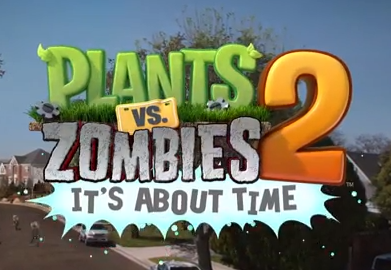
Since PopCap was acquired by Electronic Arts nearly three years ago, the Seattle-based game maker has had its fair share of troubles: Layoffs, game cancellations, studio closures and executive departures.

But PopCap’s co-founder John Vechey, who was named as the executive in charge of PopCap in January, said he can’t blame the problems on Electronic Arts, which paid up to $1.3 billion for the Bejeweled and Plants vs. Zombies creator.
“We made the right decision,” Vechey said in an interview with GeekWire.
“EA has a reputation for acquiring companies and ruining them, and it’s different being a part of a big company, and there’s things that suck about being a part of a big company, and there’s things that suck about being independent — and that’s life,” he said.
Instead of pointing fingers, or wishing PopCap had gone public or been sold to another suitor (widely rumored to be Zynga), Vechey said PopCap’s problems can be blamed on one thing: the transition from making games for sale to making games for free.
“When I look at where PopCap is in the transition to freemium, it’s been in our hands. Our success or failure is on us,” he said. “EA is a supportive partner in that.”
In the 30-minute interview, Vechey spoke very bluntly at times about what’s been happening at the Seattle-based video game maker since CEO Dave Roberts retired in January.

Reports started circulating two weeks ago about the most recent round of cuts at the Seattle-based studio. An EA spokesperson declined to discuss the layoffs in detail, but a source tells GeekWire that 30 people were let go, leaving roughly 265 employees. (That doesn’t include PopCap’s team in Canada, where it is developing high-definition console games).
Vechey acknowledges that a lot mistakes have been made, and to correct the course, he’s had to make a lot of unpopular decisions. At the top of the list were more layoffs, but he’s also canceled games and shut down projects and scaled back teams.
When PopCap was independent, it focused on maximizing profitability and was very conservative, but under EA’s wing, “we got undisciplined and stupid, and so from my side of things — when I get handed the reins — we were getting back to our roots. We are killing products that aren’t going to make it, and we are going to be conservative with how fast we are growing.”
One problem was that PopCap increased the number of games it was developing on Facebook right as the industry started to shift to mobile games. Another problem plaguing PopCap were the size of game teams. The bigger they got, the faster they moved, and then the games didn’t receive the proper amount of scrutiny. And yet, despite this increase in size and speed, game releases slowed and projects weren’t shipping regularly.
One example of the undisciplined approach was the creation of 4th & Battery, a games studio named after the company’s headquarters’ cross streets, where employees were encouraged to quickly test “strange or marginal ideas,” according to an announcement at the time.
 “I wish that would go away from the history of all things,” Vechey put bluntly. “I was not a part of 4th & Battery, but candidly, it wasn’t a very good idea for how to run a business. We can’t do just random stuff.”
“I wish that would go away from the history of all things,” Vechey put bluntly. “I was not a part of 4th & Battery, but candidly, it wasn’t a very good idea for how to run a business. We can’t do just random stuff.”
While PopCap fans were excited about the idea of quirky games from the videogame maker, they still had high expectations. In the end, the idea was expensive in both time and money as the team worked on games that never went far because there was no formal process for how to turn the game into anything more than an experiment.
“If there was one thing I could remove from the history books … ” Vechey said, referring to 4th & Battery, his voice trailing off.
With 4th & Battery trashed, Vechey has created a new way for the company to experiment in a controlled fashion. It’s called PopLabs. It’s about giving the game teams creative discipline to help find the right balance between developing a fun game that monetizes well in today’s free-to-play market. That balance is particularly hard to strike, he says.
“I’m quite confident we’ve figured it out. We were independent for 11 years and now we have been with EA for a couple of years. We’ve done a lot of things right,” he said. “We don’t need a hit every year, but if we get one every four or five years, that’s an amazing business — that’s incredibly stellar.”



